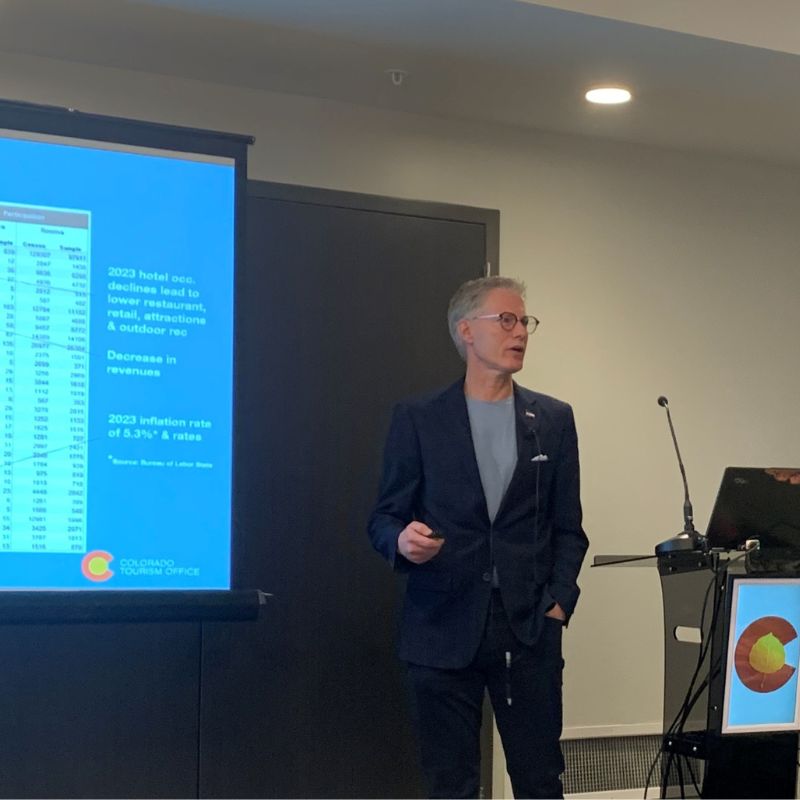Plan your next meeting in
Colorado
Start Researching
Start Planning
State of the Meetings and Events Industry in 2024
Leaders of VISIT DENVER and the Colorado Tourism Office share this and other travel insights
By Beth Buehler
Planners and suppliers looking for the latest information regarding the state of the meetings and events industry in 2024 were in luck at the a recent sold-out Destination Colorado Meetings’ membership meeting held Feb. 22 at Vib Hotel by Best Western Denver RiNo. Confirmation about how the industry and tourism overall is faring after the roller-coaster ride of the COVID pandemic is top of mind.
Targeted information that dials into state-specific statistics and happenings is especially valuable and Tim Wolfe, director of the Colorado Tourism Office (CTO), and Richard Scharf, president and CEO of VISIT DENVER, were on hand to discuss the numbers, group business, marketing campaigns and upcoming plans. Here is a brief look at the information presented.
Observations from VISIT DENVER
Scharf, the longtime leader of the state’s largest destination marketing organization, suggested that one word best describes the state of the meetings and events industry in 2024: adaptability.
Travel recovery for the U.S. after the initial impacts of COVID is nearly complete (including travel spending, air passengers, hotel demand and short-term rental demand), except for international travel. While outbound international travel is solidly back, inbound travel is lagging when compared to 2019. On a local level, Denver International Airport is back to pre-COVID levels and ranks sixth in the world for passenger traffic. VISIT DENVER was awarded a recovery grant from Colorado Tourism Office for international promotional efforts in 2023 and 2024, and the organization has representation in Canada, Mexico, Germany, France and the United Kingdom.
How 2024 turns out will be a tug of war between an economic slowdown and the resulting response of travelers, Scharf noted. While travel planning for leisure travelers remains stable, trip volume is flat, but spending is up. This is happening in tandem with the fear of recession declining steadily among consumers over the past year. Demand for Colorado and Denver are high, with a study conducted by MMGY demonstrating that 56% of those surveyed indicated they want to visit Colorado, which ranks third only after Hawaii and Florida. Overall, Denver ranked 16th in the U.S., with 44% saying the city is on their travel wish list.
This bodes well for bleisure travel in Colorado. In the survey “A Portrait of Meeting & Convention Travel” by MMGY, approximately 50% or more of respondents said they are likely or highly likely to extend a business trip in the next 12 months for personal/leisure purposes before or after a conference or convention.
Transient and group business travel made significant progress in 2023, with small and medium companies driving the recovery. The slow and steady return of workers to the office has boosted demand for business travel, which is demonstrated by weekday occupancy at hotels increasing, especially in the top 25 U.S. hotel markets. Power networking, executive field trips and the blending of travel itineraries are among business travel trends.
Scharf also referenced top meeting and event trends as identified by Marriott International such as nontraditional event spaces (e.g., vacant malls and unexpected outdoor areas), a renewed focus on networking, inclusive experiences, and interest in connecting attendees with the communities where gatherings are held. In addition, there is an uptick in large meetings and a generational shift, with event design catering to Gen Z attendees by shortening sessions and adding gamification to help build engagement.
In terms of conventions, VISIT DENVER experienced record-setting lead volume in 2023; however, January 2024 future booking room nights was 81% of what was on the books in January 2020. Citywide bookings are returning, and there have been short-term citywide opportunities due to Dallas, Austin and Orlando relocations. The organization will be focusing on enhancing site inspections in 2024 and continuing collaborations with hotel partners and the newly expanded Colorado Convention Center.
Updates from Colorado Tourism Office
Among the new CTO initiatives mentioned by Wolfe during his state of the industry report included running local campaigns and reviewing private partnerships for Do Colorado Right, becoming only the third state in the U.S. to have a Michelin Guide, and pursuing dynamic pricing options for hotels serving tour operators.
The $10 million Colorado Meeting & Events Incentive Program, a statewide program offered through CTO with help from partners like Destination Colorado Meetings, came to an end on Jan. 31, 2024. After 36 months and 681 applications, all funding has been allocated. The program provided pre-approved applicants with a 10% rebate (between $3,500 and $100,000) against the eligible hard costs of hosting meetings and events in Colorado.
Also, approximately $2 million in Federal Economic Development Administration money was granted to Aurora, Colorado Springs, Denver, Fort Collins, La Junta, Logan County and Loveland.
With tourism numbers for 2023 not quite available, Wolfe compared visitor spending in 2021 to 2022, with Denver, El Paso, Eagle, Arapahoe and Summit being the top five counties in Colorado in terms of gains. Denver and the Front Range in particular drove recovery in 2022. Overseas arrivals gradually increased throughout 2023, with Colorado outpacing the U.S. by a fair amount. Overall, declining hotel occupancy and rates, which leads to lower STR revenues, is expected for 2024, Wolfe reported.
He also explained how CTO is funded and compared Colorado’s tourism budget to other states. Colorado’s tourism budget is $20.3 million compared to $35 million for Arizona, $29.4 million for Utah, $26 million for Wyoming, $23.5 million for Missouri and $21 million for New Mexico. CTO’s budget has to be approved annually and has been flat since 2016, when there was an increase of $2 million.
In terms of lodging taxes, which is a common way to fund tourism groups and initiatives, Denver ranked 36th out of 150 cities, with Aurora coming in at 99th and Colorado Springs at 141st for total taxes on guest rooms. Overall, Colorado ranked 47th in terms of tax rates on lodging accommodations.
These statistics are among the reasons that an enterprise fund model is being considered to provide a more solid foundation for funding the Colorado Tourism Office. In brief, an enterprise fund is passed by legislators, operated as a government-owned business, housed in an existing state agency, and ran by a state employee (CTO). A percentage of room revenue paid by guests is remitted to the state (.02% or 20 centers per $100) and cannot exceed $20 million per year, which is measured over a five-year period with a total cap of $100 million. Enterprises cannot levy taxes and must provide goods and services in exchange for fees.
Much more detailed information was provided by Wolfe, including expected results and a timeline of how an enterprise fund might be passed and implemented in Colorado.
For other state of the meetings and events industry information in 2024 on national and global levels, check out American Express Global Business Travel’s annual Global Meetings & Events Forecast, Cvent’s industry trends, and research conducted by industry associations such as MPI and PCMA. Staying informed and attending presentations such as those offered during Destination Colorado Meetings’ member gatherings and the annual Meetings Industry Council of Colorado Educational Conference and Trade Show also is key to staying in tune with the latest trends and numbers.
Top Photo: Denver skyline, courtesy of Bob Ashe/VISIT DENVER
Colorado native Beth Buehler has been editor of Colorado Meetings + Events magazine for 19 years, helped launch Mountain Meetings magazine, and was on the team that introduced Southwest Meetings + Events. She has planned numerous meetings and events and enjoys exploring Colorado.



